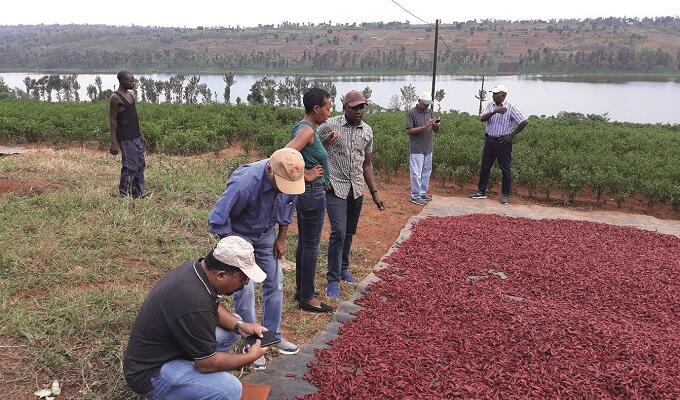

De-risking diversification into high-value export crops for farmers in Rwanda (en)
Small-scale farmers in Rwanda, as in many developing countries, are prone to finding themselves in a sort of low-income trap. The traditional crops they grow are subject to price volatility in local markets as well as farther afield. Competitive pressures and weak market power keep their margins thin at home, while fluctuations in global supply can cause prices to rise and fall unpredictably.
Shifting cultivation into higher-value products and tapping into export markets for niche products, rather than bulk commodities, offers potential to increase incomes while reducing exposure to price volatility for individual crops. Certain higher-value products offer considerable potential for processing, which allows communities to capture more value from their crops while further insulating them from sharp swings in prices.
But even when local agronomic conditions are favourable for new high-value crops, investing in diversification comes with risks: unfamiliar seedlings and plants may not behave as planned, or market demand might disappoint, causing income losses. For smallholders operating close to subsistence levels, the potential costs of diverting land, money and labour into new crops might be too high to justify.
The response
Together with Rwanda’s National Agriculture Export Development Board (NAEB), ITC has been working with farmers in the country’s Eastern Province to de-risk efforts to diversify into high-value chilli varieties. Bred for high quality and characteristics such as ease of labour-intensive de-stemming, chilli varieties such as Sarpan Dandicut-2, Namdhari and Teja are sought after in export markets including India and several African countries. Fourteen farmers, who mainly used to grow low-value crops such as beans and maize, participated in the chilli pilot in 2018.
Through the Supporting Indian Trade and Investment for Africa project, ITC identified partners and brokered cooperation to reduce each of the different sets of risks for the Rwandan farmers.
To address challenges related to growing unfamiliar crops, ITC brought in Indian spices experts to train farmers on every step of chilli production, from establishing nurseries to grow seedlings through to field preparation, planting, fertilizer use, pest control, flowering and harvesting. Gashora Farm, in the province’s Bugesera District, served as a demonstration site for participating farmers to observe and implement in practice what they had learned.
Additional training work covered chilli-related processing, such as on-farm drying and packaging, and how to price and grade dried chillies.
To pre-empt the risk that the new chillies would find no buyers, ITC facilitated a buy-back arrangement with a South Indian spice extraction company which specializes in food flavouring and colouring. The company supplied seeds to grow the red chillies it wanted to import from Rwanda; experts from the company also participated in the training activities. The buy-back arrangements sought to provide security and confidence to both the farmers and the buyer: purchase orders clearly delineated transaction terms such as quantities, payment, delivery, pricing, quality standards and other requirements.
Finally, to reduce the chances that the smallholders’ chillies would fail to reach export markets in India and elsewhere because of their unfamiliarity with trade-related logistics procedures, ITC supported them to learn about export documentation; container packing and fumigation; and working with shipping companies.
The results
In April 2018, Rwandan farmers shipped 22.5 metric tons of top-grade dried chilli worth nearly $23,000 to India, signifying the start of a new export industry for the country. The chillies met health and safety requirements easily. The Indian company used the chillies to produce oleoresins.
The Rwandan farmers involved in chilli production report higher incomes and increased savings as well as capacity to spend on clothing, housing and medical care.
The future
The number of farmers growing chillies has increased, as has the area under under cultivation, promising greater production and sales in 2019.
ITC is working with four leading Indian spice companies to further expand chilli acreage and varieties in Rwanda and the broader region. One of the companies is now growing organic chillies, which once certified will command price premiums, in Rwanda. Beyond chilli, the companies have expressed an interest in cultivating rosemary, ginger and turmeric in Rwanda. They are also exploring possibilities for rosemary production in the United Republic of Tanzania.




